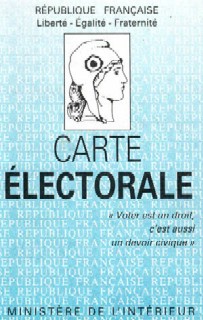
However, they are strongly advised to verify, before the deadline, that the registration has indeed been recorded. Indeed, even though the 1997 law allows for the automatic registration of a young person who has turned 18, the files sent annually by INSEE to the civil status services of the city halls are often incomplete. Regarding administrative formalities, they must bring the same documents as other people undertaking the process (those who have moved or acquired French nationality in 2006). These documents are: proof of residence less than three months old and a valid identity card or passport. They can then register on the electoral lists at one of the ten annex city halls in Nice.
The Youth: Main Targets
A report by the Civisme et Démocratie (CIDEM) association estimated in October that more than two million people of voting age were not registered on the electoral lists. Nevertheless, some attempts have been made, or have taken place, to convince them. For example, the city hall of Nice is currently distributing documentation in public places. It also places an announcement every week in Nice-Matin to encourage registration. All these actions particularly target young people, because due to demographic changes, they represent a continuously decreasing portion of the French electorate. One remembers, for example, the one led by the Devoirs de mémoires collective in December 2005 after the riots in the suburbs. Supported by multiple personalities like Lilian Thuram, Joey Starr, and Jamel Debbouze, this collective had called on “young and old” to register on the electoral lists. The goal was to “build the future” and especially to avoid reliving another April 21, 2002.
At present, it is extremely difficult to measure the impact of this call. According to CIDEM, less than 1% of people of voting age registered on the electoral lists at the end of 2005. Marc Dotta, head of the elections and census department at the city hall of Nice, shares his opinion on this action: “Initially, the idea wasn’t bad. But it didn’t have a real effect.” He adds: “It was more of a shot in the dark than anything else.” The man remains confident nonetheless and observes a citizen awakening: “The Sarkozy/Ségolène duel captures all the media’s attention. It has caused the campaign to start much earlier than in previous elections. Consequently, there is greater politicization of minds, especially with the contribution of numerous televised debates.”
Political Parties Also Get Involved
City halls are not the only ones encouraging young people to register. Many political parties have also embarked on this path, as have their youth sections. The initiative of the MJS (Mouvement des Jeunes Socialistes) perfectly reflects this approach. Promoted through a blog (preparonslechangement.net), the movement is currently conducting a large campaign to enable young people to participate in the vote. And at the same time, to influence the vote. This campaign particularly targets housing projects and other sensitive areas where the rates of non-registration and abstention are high. Students are not forgotten, quite the contrary. In collaboration with the PS, the MJS is trying, on university campuses, to mobilize them as much as possible. This approach is based on a simple observation: many students do not vote in the city where they study. And many will not make a countless number of trips between the place of their studies and the place they are registered. Result: they will join the ranks of the abstainers. To avoid this kind of situation, the young socialists urge students to register on the electoral lists of the city where they are studying.
Voting by proxy is, however, on the perpetual rise. “With each election, this type of vote increases. For the city of Nice, this represents 5000 people out of 205,000 registered voters,” explains Marc Dotta. It seems, however, that despite the simplification of the procedures to follow for voting by proxy, not everything is yet in place. The official agrees and admits somewhat crestfallen: “It’s a little less of an obstacle course than before. But you still have to go to the police station to establish the proxy.”
He reminds us that registering at the city hall: “It currently takes only five minutes. The more we wait until December 30, the longer the queues become. No less than 6000 registrations are expected in the last month.” So go ahead now!


